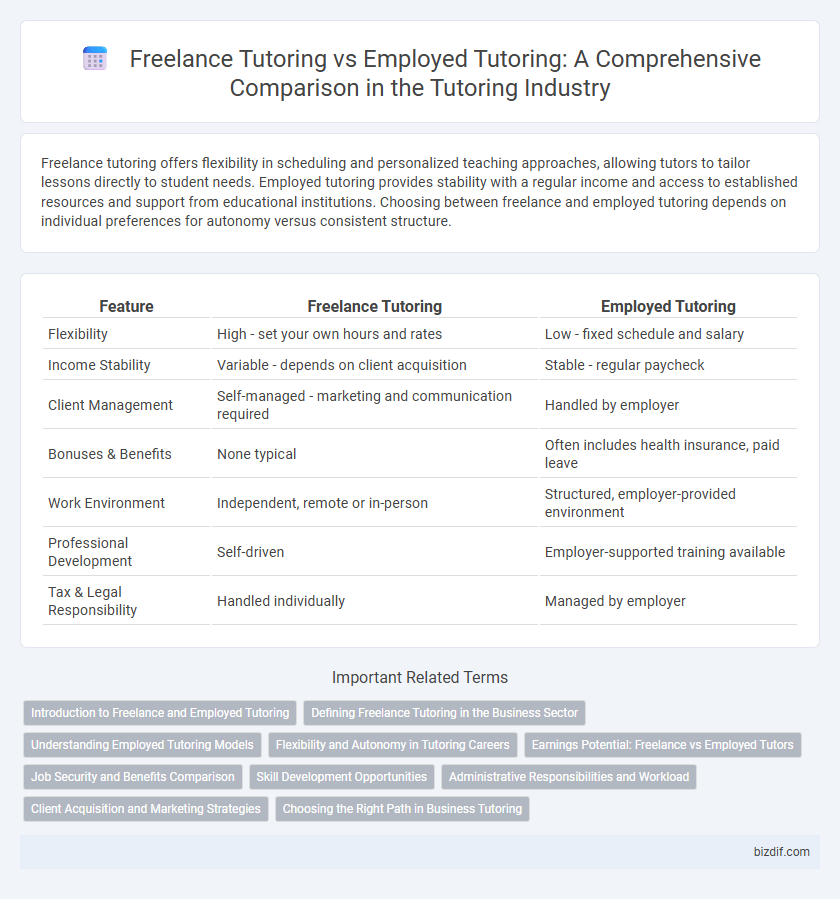Freelance tutoring offers flexibility in scheduling and personalized teaching approaches, allowing tutors to tailor lessons directly to student needs. Employed tutoring provides stability with a regular income and access to established resources and support from educational institutions. Choosing between freelance and employed tutoring depends on individual preferences for autonomy versus consistent structure.
Table of Comparison
| Feature | Freelance Tutoring | Employed Tutoring |
|---|---|---|
| Flexibility | High - set your own hours and rates | Low - fixed schedule and salary |
| Income Stability | Variable - depends on client acquisition | Stable - regular paycheck |
| Client Management | Self-managed - marketing and communication required | Handled by employer |
| Bonuses & Benefits | None typical | Often includes health insurance, paid leave |
| Work Environment | Independent, remote or in-person | Structured, employer-provided environment |
| Professional Development | Self-driven | Employer-supported training available |
| Tax & Legal Responsibility | Handled individually | Managed by employer |
Introduction to Freelance and Employed Tutoring
Freelance tutoring offers flexible scheduling and personalized client selection, allowing tutors to set their own rates and tailor lessons to individual student needs. Employed tutoring typically provides a stable income with set hours, benefits, and access to institutional resources, often within schools or tutoring companies. Understanding these distinctions helps tutors choose a path aligned with their career goals and lifestyle preferences.
Defining Freelance Tutoring in the Business Sector
Freelance tutoring in the business sector involves independent professionals offering specialized educational services without long-term contracts or employer obligations, allowing for flexible scheduling and customized client engagement. Tutors operate as self-employed entrepreneurs, setting their rates, managing marketing efforts, and delivering tailored sessions to meet specific corporate training needs. This model emphasizes autonomy, direct client relationships, and the ability to adapt rapidly to shifting market demands within business education.
Understanding Employed Tutoring Models
Employed tutoring typically involves working through established educational institutions or tutoring companies, offering a structured schedule and consistent pay. These models often provide access to curriculum resources, training, and professional support, ensuring tutors align with institutional goals and standards. Understanding employed tutoring helps clarify benefits like job security and fixed hours compared to the flexibility found in freelance tutoring.
Flexibility and Autonomy in Tutoring Careers
Freelance tutoring offers unparalleled flexibility, allowing educators to set their own schedules and select clients that align with their expertise, leading to greater autonomy in career management. Employed tutors often work within structured hours and curricula, which can limit creative freedom but provide consistent income and resources. The choice between freelance and employed tutoring hinges on the tutor's preference for independence versus stability in their professional lives.
Earnings Potential: Freelance vs Employed Tutors
Freelance tutoring offers a higher earnings potential due to flexible hourly rates and the ability to set personalized pricing based on expertise and demand, often surpassing standard employed tutor salaries. Employed tutors typically receive fixed wages, which can limit income growth despite benefits such as job security and consistent hours. Building a client base and managing administrative tasks are critical for freelancers to maximize revenue, whereas employed tutors benefit from steady paychecks without these responsibilities.
Job Security and Benefits Comparison
Freelance tutoring offers flexible schedules and autonomy but typically lacks job security and employer-provided benefits such as health insurance, retirement plans, and paid leave. Employed tutoring positions often provide stable income, structured work environments, and access to comprehensive benefits packages, enhancing financial stability and long-term career growth. Comparing job security and benefits highlights that employed tutors enjoy more consistent support, while freelancers benefit from independence but face greater financial risks.
Skill Development Opportunities
Freelance tutoring offers diverse skill development opportunities by exposing tutors to various subjects, student needs, and teaching methods, enhancing adaptability and problem-solving abilities. Employed tutoring typically provides structured training and consistent feedback, fostering deep expertise and mastery within specific curricula. Both pathways contribute uniquely to professional growth, with freelancers gaining broad experience and employed tutors building specialized pedagogical skills.
Administrative Responsibilities and Workload
Freelance tutoring requires managing all administrative responsibilities such as scheduling, invoicing, and client communication independently, which can significantly increase workload outside of teaching hours. Employed tutors typically benefit from organizational support, with administrative tasks handled by the employer, allowing them to focus primarily on lesson delivery. Understanding these differences helps tutors choose a working style that balances teaching with necessary non-teaching duties.
Client Acquisition and Marketing Strategies
Freelance tutoring relies heavily on personal branding and digital marketing strategies such as social media promotion, SEO-optimized websites, and online tutoring platforms to attract clients directly. Employed tutors benefit from institutional client acquisition where schools or agencies handle marketing, providing a steady stream of students without the need for individual advertising efforts. Effective freelance tutors also leverage word-of-mouth referrals and local networking to build a consistent client base, contrasting with the stability but limited autonomy in employed tutoring roles.
Choosing the Right Path in Business Tutoring
Freelance tutoring offers flexibility in scheduling and personalized pricing, allowing educators to tailor sessions to individual student needs while managing their own client base. Employed tutoring provides job stability, consistent income, and access to institutional resources, making it ideal for those seeking structured professional environments. Evaluating factors such as autonomy, financial goals, workload, and career growth opportunities helps determine the best fit between freelance and employed tutoring in the business education sector.
Freelance Tutoring vs Employed Tutoring Infographic

 bizdif.com
bizdif.com